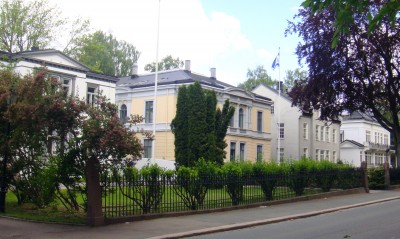The Norwegian Broadcasting Council has rejected complaints from the Israeli embassy in Norway that Norwegian Broadcasting (NRK) has been biased against Israel in their news reporting.

The council, which is made up of eight members appointed by parliament and six appointed by the government, “reviews programme complaints from the audience,” and issues raised by council’s members or NRK’s Director General. Their public hearing on Thursday lasted nearly three hours, and looked at complaints from the Israeli ambassador that NRK’s new coverage for the last 30 years, and its current Middle Eastern correspondent Sidsel Wold, had taken sides in the Israel-Palestine conflict and shown “continuous journalistic deficiencies.”
Council rejects complaints
Middle East expert Cecilie Hellestveit of the International Law and Policy Unit was asked to undertake an independent, external investigation into a number of NRK programmes over a three-year period, including evening news and current affairs shows, 161 news reports and 374 sources. NRK also presented evidence from their own internal investigation. This analysis showed that 52 percent of the sources used in stories on the issue were Norwegian, 16 percent were Palestinian and 15 percent were Israeli. A majority of the Israeli sources were professional or public sources, while the Palestinian sources were generally from witness and individuals.
A majority of the council decided that NRK’s coverage had been “reliable, balanced and thorough,” and its conclusion encouraged a “broad and nuanced” debate on the issue without criticizing NRK’s coverage directly. A member of the council, Grethe Fossum, commented in stronger terms to newspaper Aftenposten that “NRK is not a part of this conflict, they have not given unbalanced coverage, they do not pass judgment on Israel, they use facts instead of feelings, and their coverage has not led to increased hostility in Norway,” adding that Israel had managed this “on their own.”
Complaints ‘not out of thin air’
Researcher Hellestveit found a number of positives and negatives in NRK’s reports, and gave a far more ambiguous opinion to the council. As reported in Aftenposten, she told the council that “when it is claimed in the complaint from the Israeli embassy that NRK is biased against Israel, and based on emotional coverage, this is not completely pulled out of thin air, but the explanation for this lies in a completely different place than NRK’s intensions.” She believes that NRK has not given either side a raw deal in any way, but that the issue is how the presentation of the conflict is angled. Speaking to NRK, she gave the opinion that the broadcaster has “a tendency to underreport Israeli conditions.”
“This is a conflict with many truths that does not lend itself to quick news coverage,” Hellestveit continued. “There are many alternative interpretations that can never all be together in the same broadcast. At the same time, this conflict has a number of symbolic dimensions – religious, poor and rich, strong and weak, north and south, white and less white – meaning that many have a very strong moral or emotional view of the conflict. It is therefore demanding to cover the conflict.”
Sources ‘do not make themselves available’
Hellestveit picked out NRK’s evening news coverage, Dagsrevyen, for particular praise. “It is difficult to present how this could be done in a better way,” she said. “They arrange a particularly balanced broadcast of events that happen, and consider how all or several voices can come forward.” There are, according to Hellestveit, “problems in programmes where they go a little deeper into the issue.” She said that NRK “can become a prisoner of their own interpretation of the facts” in such programmes.
The researcher partly blamed the sources available for this. “In the cases where NRK tried to take its coverage in another direction, the sources that they wanted to have did not make themselves available,” she stated in Aftenposten. NRK’s correspondent, Sidsel Wold, in particular told the council that it could be difficult to get Israeli officials to come forward in order to give the other side in reports. She told NRK that she had made “many reports” in an attempt to address issues in Israeli society and avoid the demonization of Israel. “Israel is an occupier, the Palestinians are occupied. If I or others in NRK ignore that this is the case, we would not be doing our jobs,” she added.
Join our Reader Response if you’d like to comment on this story.

